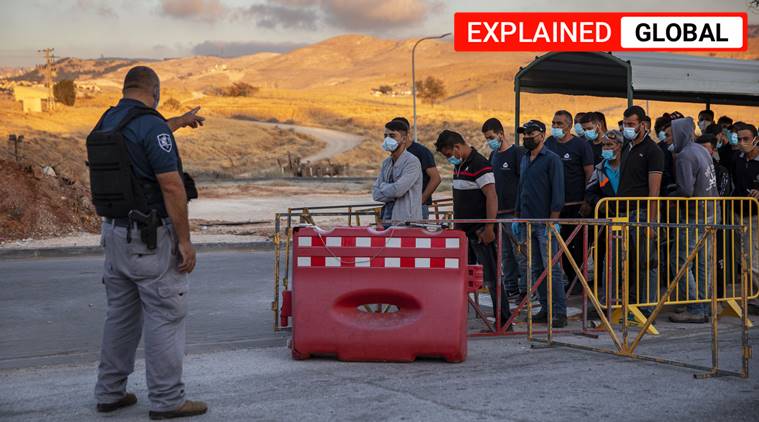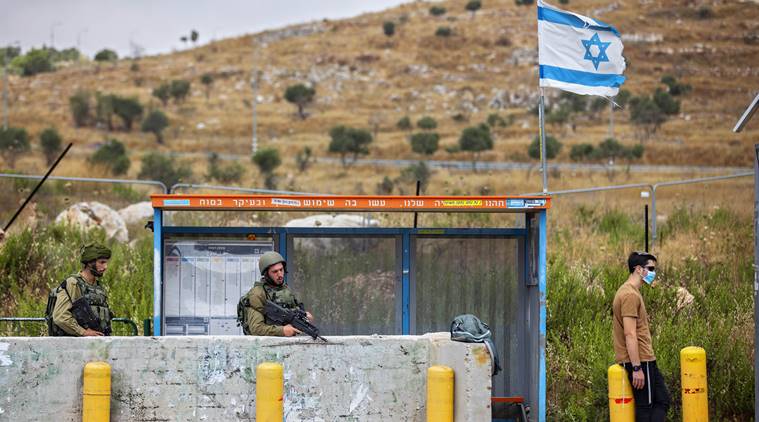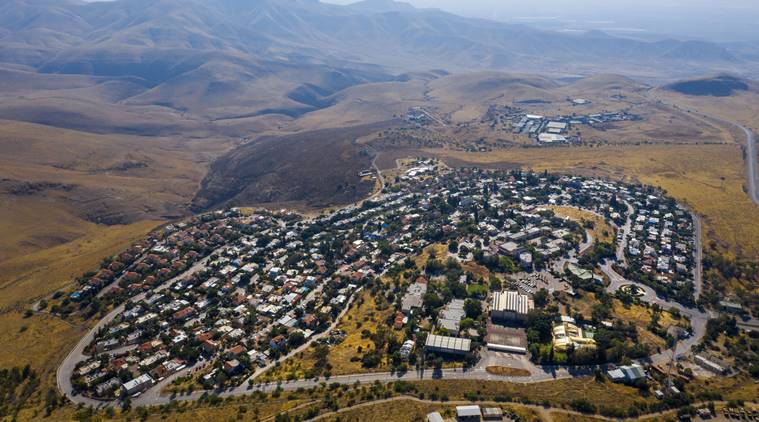- India
- International
Explained: Israel’s plan to annex West Bank and why is Netanyahu doing it
These annexation plans have been extremely controversial because it would mean Israel unilaterally declaring sovereignty over parts of occupied Palestinian territory in the West Bank. Such moves by Netanyahu are also contrary to the two-state solution and have the potential to trigger further conflict in the region.
 Palestinians laborers line up to cross a checkpoint at the entrance to the Israeli settlement of Maale Adumim, near Jerusalem (AP)
Palestinians laborers line up to cross a checkpoint at the entrance to the Israeli settlement of Maale Adumim, near Jerusalem (AP)
In 2019, weeks before the Israeli legislative election in April, Prime Minister Benjamin Netanyahu had stated that he had plans to annex the Israeli settlements in the West Bank. Months later, in September, Netanyahu said that his government was considering annexing the Jordan Valley if he were to be reelected.
These annexation plans have been extremely controversial because it would mean Israel unilaterally declaring sovereignty over parts of occupied Palestinian territory in the West Bank. Such moves by Netanyahu are also contrary to the two-state solution and have the potential to trigger further conflict in the region.
Where is the West Bank?
The West Bank is located on the west bank of the Jordan River and is bounded by Israel on the north, west and south. On the east of this river lies Jordan. Since the Six-Day War in 1967, also known as the Third Arab-Israeli War, the West Bank has been occupied by Israel. Both Israelis and Palestinians assert their rights to the territory of the West Bank and its disputed status and the conflict has not been resolved as yet.
The Palestinians who live in the West Bank live under Israeli military rule, as well as limited self-rule. Also present in the West Bank are some 132 Israeli settlements and 124 unauthorised settlements, along with military outposts. While the Israeli government and the US under the Trump presidency have insisted that these settlements are legal, the larger international community does not believe so and considers these settlements to be illegal under the provisions of international law.
What does this annexation mean?

Netanyahu has claimed that his plans do not involve an annexation of the West Bank. However, it would mean enforcing Israeli sovereignty over Israeli settlements and a significant chunk of land in the Jordan Valley, an area near the Jordanian border; approximately 30% of total land in the West Bank. The Palestinians believe that the annexation would prevent their access to essential water resources and key agricultural land, particularly in the Jordan Valley.
 Palestinians demonstrate against Israeli plans for the annexation of parts of the West Bank, in Gaza City (AP)
Palestinians demonstrate against Israeli plans for the annexation of parts of the West Bank, in Gaza City (AP)
Although Netanyahu has said that Israeli sovereignty would not be enforced over Palestinians, it would mean that thousands of Palestinians would automatically fall under the annexed territory. The exact boundaries of this annexed territory is being discussed and charted by Israel and the US.
Israel is claiming that these settlements that it has established across the West Bank would continue to be Israeli territory under any peace deal with the Palestinians, regardless of their annexed status.
Why is Israel doing this?
Palestians have sought the entire territory of the West Bank and the Gaza strip for an independent Palestinian state in the future, to which they claim historical right. Israel, on the other hand, claims that it has historical and religious rights over the West Bank because it believes that the territory is the ancestral land of the Jewish people.
Israel has also cited national security as a reason behind this move, claiming that it particularly needs military presence in the strategic Jordan Valley area for its own self-defence and national interests. Among other reasons, Palestinians have objected to these annexation plans because it would leave them with significantly less land for an independent nation of their own in the future.
📣 Express Explained is now on Telegram. Click here to join our channel (@ieexplained) and stay updated with the latest
What effect will annexation have?
In the West Bank, Palestinians are only subject to Israeli military rules and their own Palestinian laws. Observers say the annexation will largely impact the establishment of settlements and other Israeli construction in the area that has been a long-standing bone of contention between the Israelis and the Palestinians.
 Israeli soldiers guard a bus station at the Tapuach junction next to the West Bank city of Nablus (AP)
Israeli soldiers guard a bus station at the Tapuach junction next to the West Bank city of Nablus (AP)
Annexation would make it easier for individuals to engage in construction in the West Bank, that has required approval by Israel’s defence ministry and the government prior to this because annexed territory would be considered to be a part of Israel by the Israeli government. Observers say that Israeli military control will continue, without any change.
What is happening now?
On July 1, which was Israel’s planned date for the annexation, no announcement was made by the Israeli government to put the plans into motion. Two days ago, Netanyahu had indicated that his discussions with the US were continuing, which led many observers to believe that the Israeli prime minister was likely to miss his own deadline to start the annexation process.
Benny Gantz, Alternate Prime Minister and Minister for Defence of Israel, said this past week that any plans for annexation must be kept on hold keeping in mind the coronavirus outbreak. Israeli news reports have indicated that Netanyahu may still move ahead with annexation, although on a smaller scale by implementing it on settlements outside Jerusalem. According to a news report by Al Jazeera, Palestinian officials believe that annexation in the West Bank is inevitable despite any delays that may occur.
Observers believe that Netanyahu may be in a rush to implement this annexation process while Trump is in office and before the US presidential elections in November, because if Joe Biden were to become president, he may overturn US policy concerning the West Bank due to his opposition to these annexation plans.
 A view of the West Bank Jewish settlement of Ma’ale Efrayim in the Jordan Valley (AP)
A view of the West Bank Jewish settlement of Ma’ale Efrayim in the Jordan Valley (AP)
How has the international community responded?
With the exception of the US under the Trump administration, the international community has largely opposed Israel’s annexation plans. UN Secretary-General António Guterres, the EU and Arab nations had said that these moves by Israel would violate international law. There are also concerns that annexation plans may further increase hostilities between the Israelis and the Palestinians, ensuring that peace between the two would be harder to achieve. Palestinians have warned that this may just push them to declare their own independent state in the territory. There are also concerns that the annexation may just lead to a full-blown conflict in the Gaza strip and the West Bank.
In June, Jordan’s King Abdulllah had said that Israel would be putting regional stability at risk by going ahead with annexation. Reports in Israeli media suggested that Jordan would not accept even limited annexation of the West Bank and has also conveyed this to the US and some EU member states. Along with Egypt, Jordan is one of the two Arab countries that have official diplomatic relations with Israel. A report in The Times of Israel said that Jordan had threatened to downgrade its 1994 peace treaty with Israel if the annexation were to be implemented.
More Explained
Must Read
EXPRESS OPINION
Apr 20: Latest News
- 01
- 02
- 03
- 04
- 05









































